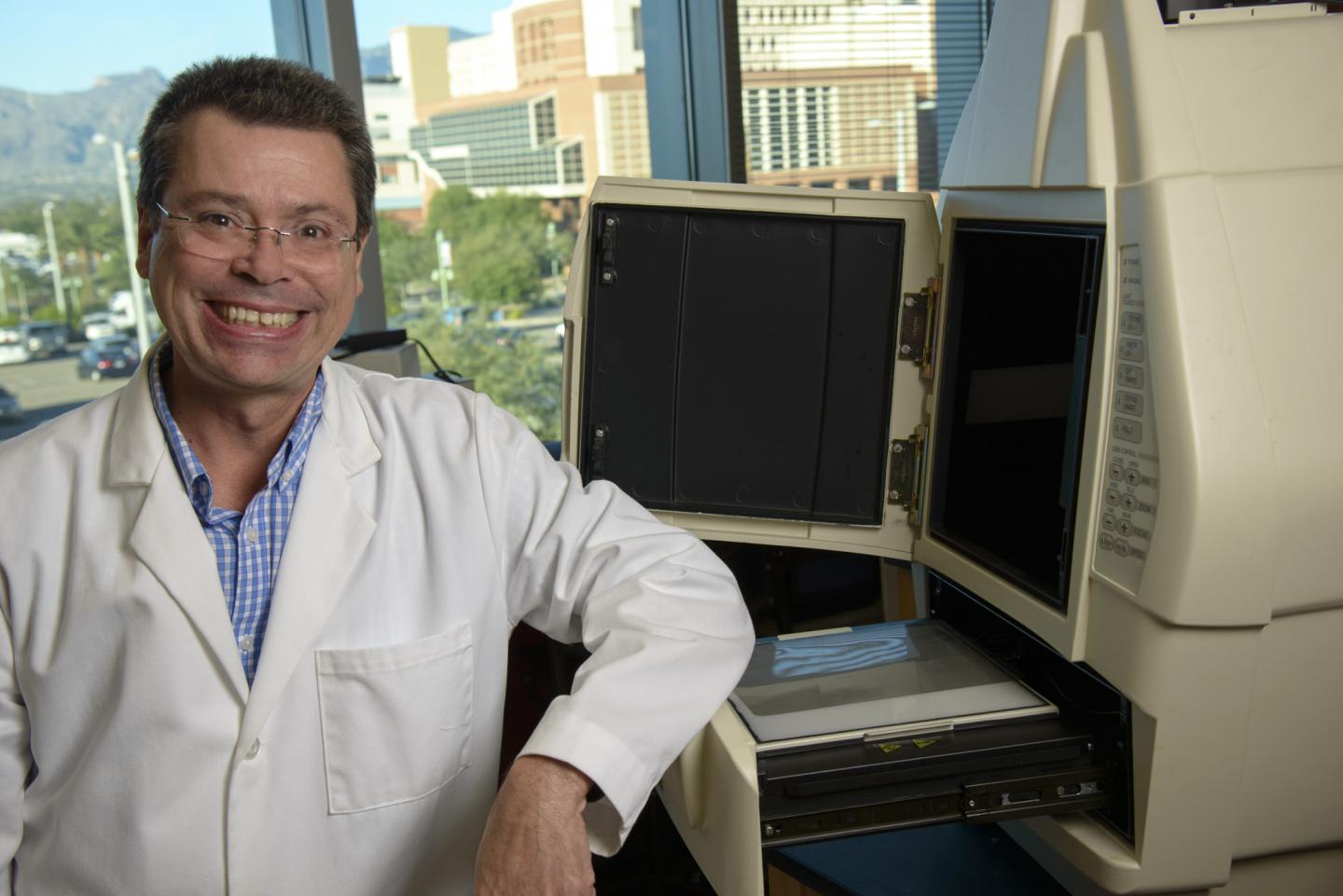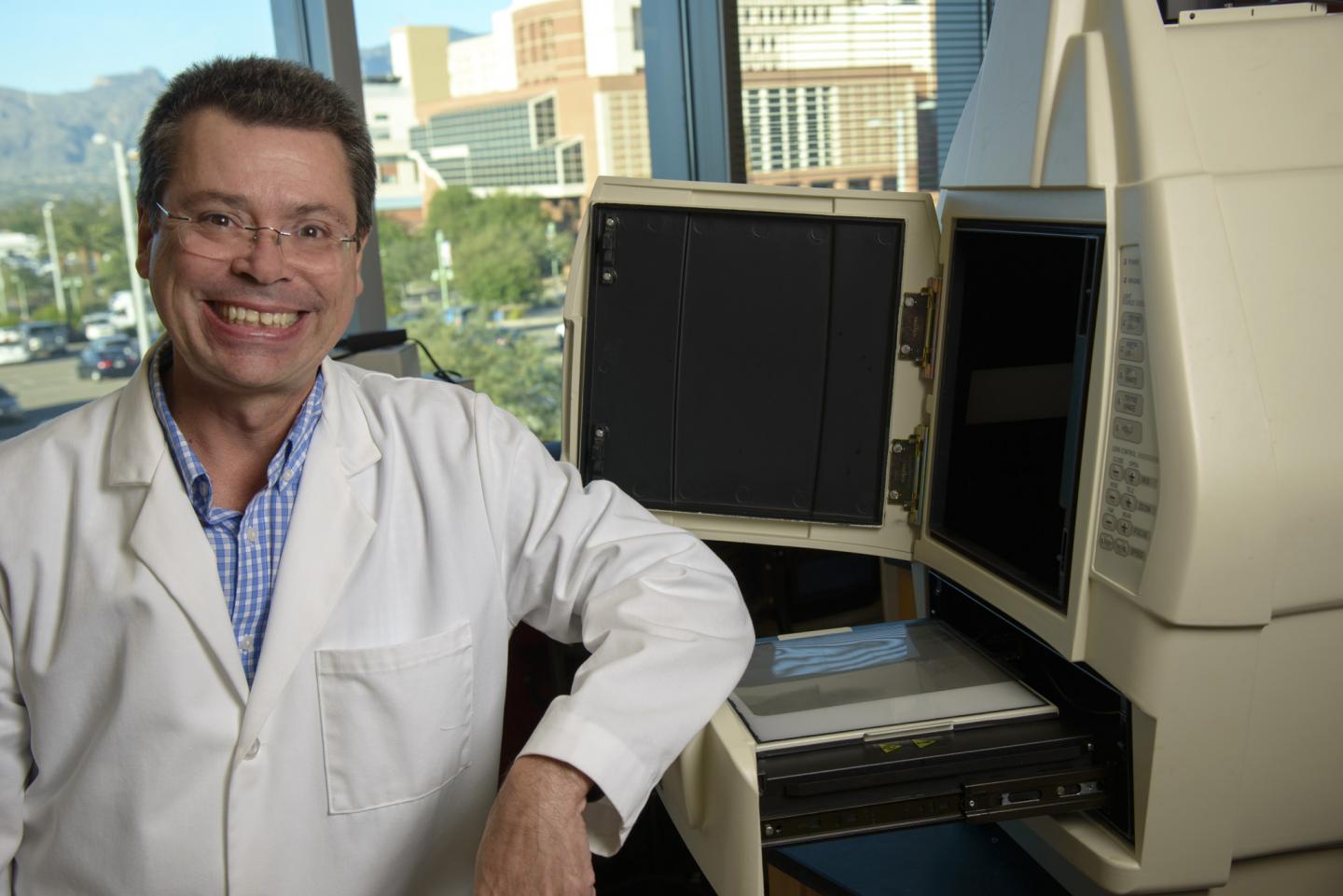
Credit: Kris Hanning, UAHS BioCommunications
TUCSON, Ariz. – After showing that individuals who take levodopa, or l-dopa, for movement disorders such as Parkinson's disease are protected from developing macular degeneration, University of Arizona researcher Brian S. McKay, PhD, is taking the next step in his quest to prevent the blinding eye disease, thanks to a $1.7 million R01 grant from the National Eye Institute of the National Institutes of Health.
Macular degeneration, also known as age-related macular degeneration or AMD, is a degenerative disease of the retina that causes loss of central vision. L-dopa is a naturally occurring molecule made in all pigmented tissues, including the retinal pigment epithelium (RPE) of the eye, where it has a role in maintaining a healthy macula, the part of the eye's retina that provides the most high-acuity color vision.
Dr. McKay's discovery that the RPE expresses a receptor for l-dopa, and that this signaling pathway fosters the survival of the retina, led to a collaborative observational study that found that patients who take a synthesized form of l-dopa, a common treatment for Parkinson's, were far less likely to develop macular degeneration, and if they did develop the disease, the onset was delayed by nearly 10 years.
"We will follow up this critical observation with cell biological studies to determine how l-dopa's effect occurs," said Dr. McKay, associate professor of ophthalmology and vision science at the UA College of Medicine – Tucson. "This grant will help us determine whether we can re-purpose l-dopa to halt the epidemic that age-related macular degeneration has become."
Age-related macular degeneration (AMD) is the most common cause of blindness in individuals over age 55 in developed countries and more than 10 million people in the United States have AMD, according to the Foundation Fighting Blindness. AMD is particularly prevalent in the Southwest with its large retired population; in Arizona alone more than 2 million people were age 50 or older in 2010, according to the U.S. Census Bureau.
"The cause of AMD isn't known, so it's difficult to develop strategies to prevent it. There is no cure, and there are no treatments for early AMD, also known as 'dry' AMD. For the roughly 10 percent of AMD patients who develop 'wet' AMD, where abnormal blood vessels grow under the retina, there is an effective treatment, however, it requires repeated intraocular injections, which are expensive and associated with risks, and don't stop the progression of the underlying disease," said Dr. McKay.
Dr. McKay will test whether intersecting pathways related to dopamine signaling may be the actual driving force behind l-dopa's protective effect rather than l-dopa itself. "This is a critical set of experiments because l-dopa is converted to dopamine in neurons and retinal pigment epithelial [RPE] cells. Both RPE cells and the retinal neurons have dopamine receptors," said Dr. McKay. "We identified a signaling molecule, GPR143, that controls two RPE activities likely to protect from AMD, and showed that l-dopa could drive both activities.
"The research will test whether GPR143 or other dopamine-related receptors bring about the protection from AMD in those taking l-dopa. Once the responsible receptors are identified, they can be targeted to develop new drugs or combination therapies to protect people from developing AMD."
###
This research is supported by NIH grant 1R01EY026544-01A1.
About the UA College of Medicine – Tucson
The University of Arizona College of Medicine – Tucson is celebrating 50 years of innovation and advancing health and wellness through state-of-the-art medical education programs, groundbreaking research, and advancements in patient care in Arizona and across the United States. Founded in 1967, the College ranks among the top medical schools in the nation for research and primary care and is leading the way in academic medicine through its partnership with Banner – University Medicine, a new division of one of the largest nonprofit health-care systems in the country. For more information, please visit medicine.arizona.edu
About the University of Arizona Health Sciences
The University of Arizona Health Sciences is the statewide leader in biomedical research and health professions training. The UA Health Sciences includes the UA Colleges of Medicine (Phoenix and Tucson), Nursing, Pharmacy and Mel and Enid Zuckerman College of Public Health, with main campus locations in Tucson and the growing Phoenix Biomedical Campus in downtown Phoenix. From these vantage points, the UA Health Sciences reaches across the state of Arizona and the greater Southwest to provide cutting-edge health education, research, patient care and community outreach services. A major economic engine, the UA Health Sciences employs almost 5,000 people, has nearly 1,000 faculty members and garners more than $126 million in research grants and contracts annually. For more information: uahs.arizona.edu. Follow us: Facebook | Twitter | YouTube | LinkedIn
Media Contact
Jean Spinelli
[email protected]
520-626-2531
http://uahs.arizona.edu/
Original Source
http://opa.ahsc.arizona.edu/newsroom/news/2017/quest-prevent-macular-degeneration-continues-ua-researchers-17m-nih-grant





